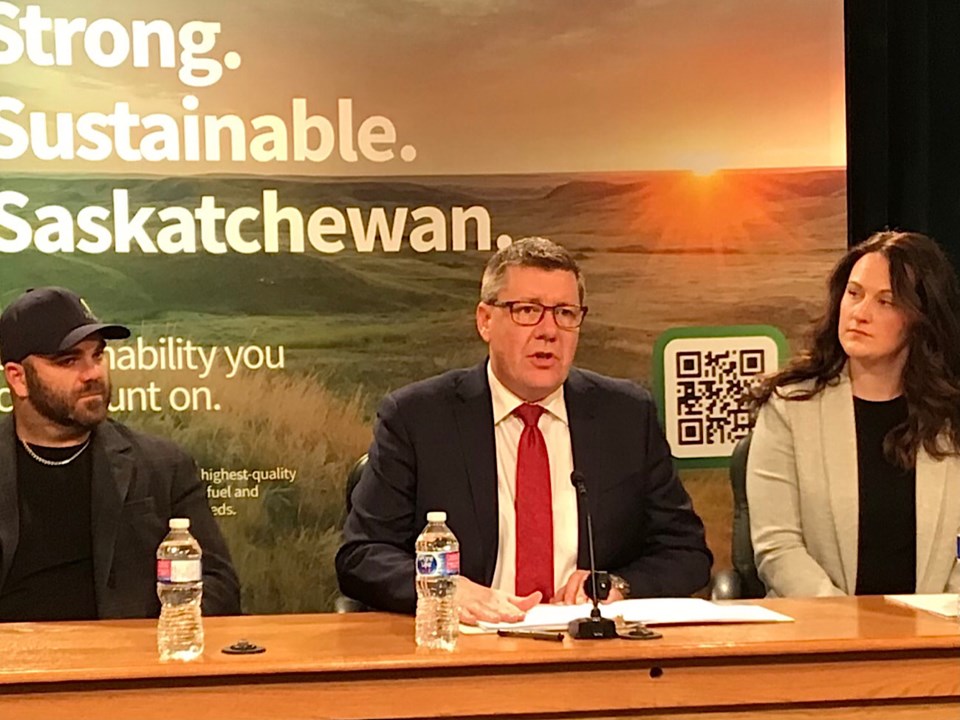REGINA - The reaction has been swift from the Saskatchewan government on news that the federal government is going ahead with an oil and gas emissions cap.
Provincial ministers, from Premier Scott Moe right on down the line, condemned the federal government's announcement on the framework for an oil and gas emissions cap. In that announcement, the Feds are calling for a 35 to 38 per cent emissions reduction by 2035.
Premier Moe, who is attending COP28 in Dubai this week, issued this statement slamming the move:
“This week at COP28, Canadian oil and gas producers have been showing the world that they produce some of the most sustainable energy products on the planet. Instead of taking the opportunity to promote Canada’s sustainable oil and gas industry on the world stage as Saskatchewan is doing, the federal government’s response has been to impose two new policies just this week, on methane and an oil and gas cap, that target this sector and burden it with more red tape and regulations.
“As confirmed in The Saskatchewan First Act, which came into force on September 15, 2023, Saskatchewan has exclusive legislative jurisdiction under Section 92A of the Constitution Act, 1867 over the exploration of non-renewable natural resources and exclusive authority to regulate the greenhouse gas emissions.
“The emissions cap targets Canada’s upstream oil and gas sector, which is already impacted by federal carbon pricing, increasingly stringent federal methane regulations, and the federal Clean Fuel Regulations and Clean Electricity Regulations.
“Saskatchewan has taken significant steps in recent years to reduce emissions. This includes reducing methane emissions by 64 per cent since 2015, installing the first operational carbon capture and storage system in the world at Boundary Dam Power Station in 2014, and investing billions of dollars in renewable energy sources such as solar, wind, biomass, and natural gas generation.
“These new federal policies will have serious economic impacts on Canadians and limit our sustainable Canadian energy products from providing heat and electricity to the world.
“Saskatchewan remains opposed to the new methane regulations and the oil and gas emissions cap, and we will protect our constitutional right to build our economy in accordance with the priorities of Saskatchewan families and businesses.”
Speaking to reporters at the Legislature, Minister of Energy, Mines and Resources Jim Reiter expressed concerns about the announcement at the legislature. He pointed to both the emissions cap and the methane announcement and accused the federal government of “changing goalposts.”
“It’s extremely disappointing. We are in a stage where world demand for world oil right now isn’t lowering, it’s been increasing. When there’s roadblocks put in the way for our energy industry, clearly oil is going to be purchased somewhere else, obviously from countries that don’t care as much about the environment as Saskatchewan companies do, as Saskatchewan citizens do. Instead, it’ll be from countries like possibly Russia, who don’t care about the environment and use it to finance the war in Ukraine. Very disappointing the federal actions this week.
“Obviously, we are seeing this week a double whammy from the federal government announced at COP,” said Minister of Justice and Attorney General Bronwyn Eyre.
“Clearly, this is going to amount to a production cut, and our partners in the sector are saying as much this morning. This will lead to curtailment. This is a regulatory stick. It sets us at odds as an industry, and as an economy with the system in the US, and clearly very, very alarming. By the government’s own count last year, when it was bandying about percentages — whether it’s 38 or 40 or 42 per cent, it’s the same impact, and that really is unfeasible without production cuts, whatever they set the percentage at.
“So we have been clear in the Throne Speech that we would be submitting this forward to the Economic Tribunal, which flows from Saskatchewan First (Act), and of course we have to look in depth at the framework they have put in place, a cap and trade system it seems, and a number of other measures which we have to obviously analyze. Quebec, as you will know, already has a cap and trade system, which is its own carveout from the Carbon Tax. We have to look at what this means in the context of that and other systems, but very, very significant for us and for the economy, and we will be certainly looking at next Constitutional and other steps.”






